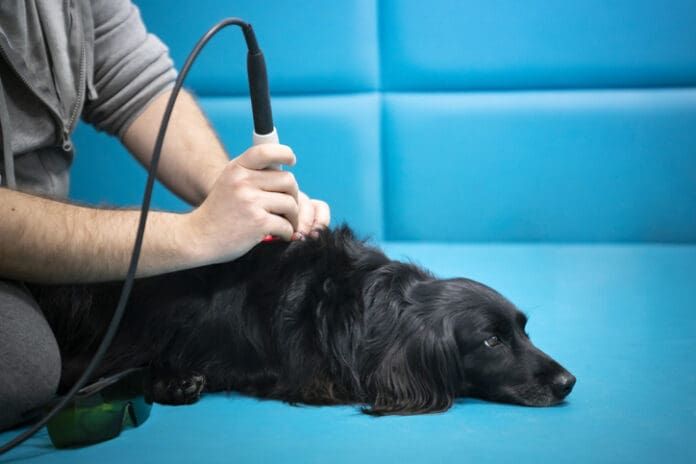There are many wonderful complementary treatments for dogs with OA. None will cure or heal the arthritic joint, but a combination of treatments can very well restore vitality and decrease discomfort, making a happy walk in the park a reality once again.
Omega-3 fatty acids, glucosamine and chondroitin, and avocado and soybean unsaponifiables (ASU) can all work to slow joint degeneration. The combination of these over several months can improve function and decrease pain. Can also be used as preventive.
Turmeric and curcumin together are a potent anti-inflammatory.
Adequan is a synthetic, injectable medication, available by veterinary prescription only. It’s thought to help increase the viscosity of the synovial fluid, which acts as the lubricant in a joint. It may be administered subcutaneously or intramuscularly. One school of thought is that the earlier Adequan is administered, the better it will modulate the arthritic progression.
Hydrotherapy is ideal for arthritic dogs. The buoyancy of the water takes weight off the joints, allowing movement without pain and building strength in muscles that otherwise may become atrophied.
Acupuncture is widely accepted by conventional veterinary practitioners, as it is highly effective at reducing pain and the heat that goes along with inflammation. Many dogs relax and fall asleep during treatment and there can be a noticeable improvement in function.
Laser therapy can penetrate deeply, down to a cellular level, depending on the type of laser used. At its most powerful, it exponentially increases circulation and works to repair damaged tissue. It is a highly effective pain and inflammation reducer.
Practiced under the supervision of a veterinarian and/or physical therapist at canine rehabilitation facilities, strength-building, balance, and conditioning exercises are the ultimate in helping your arthritic friend.
Conventional veterinary treatments include NSAIDS and steroids. These can be highly effective, but given in high doses or for long periods of time, they can cause serious side effects. Consider these as “heavy artillery” and reserve their use for severe cases and when none of the gentler therapies can relieve your dog’s pain. Also, make sure you and your veterinarian follow through with regular blood tests, to monitor whether the drugs are compromising your dog’s liver function.
Don’t forget massage therapy! It can provide relief and improves the healing of soft tissues that are irritated or inflamed, breaks up scar tissue that may form around arthritic joints, relieves stiffness, and promotes better flexibility and range of motion.
To learn more about the many ways to help your dog live better with arthritis, buy Pain Relief for Canine Arthritis from Whole Dog Journal.






